The question on everyone’s minds is what happens next?
What Next?
The question on everyone’s minds is what happens next? Where is the massive fiscal and monetary policy support leading us? Will things return to a pre-COVID normal or will the weight of unsustainable debt lead to a stagnant economy with a large number of defaults and bankruptcies stretching into the future?
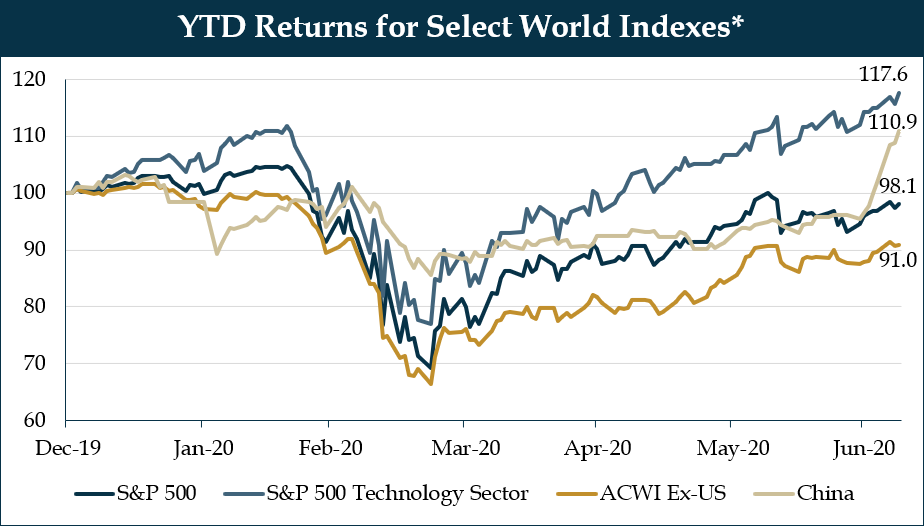
Stock markets around the world have staged a strong recovery even as business activity has recovered much more slowly. With COVID-19 infections soaring, we think stock prices are likely to correct to bring prices in-line with the not-so-great reality of business activity. Future growth prospects may also be muted due to the drag of servicing a large increase in incremental debt. We are keenly aware that predicting the future of stock prices is notoriously difficult so instead of selling all of our stocks, we recommend being at the low end of the stock exposure range for your personal situation.
If the economy was going to have a strong recovery, you would expect bond prices to fall and interest rates to increase. In particular, U.S. Treasury bond issuance has surged to finance deficits putting more pressure on bond prices. Yet, interest rates remain very low.
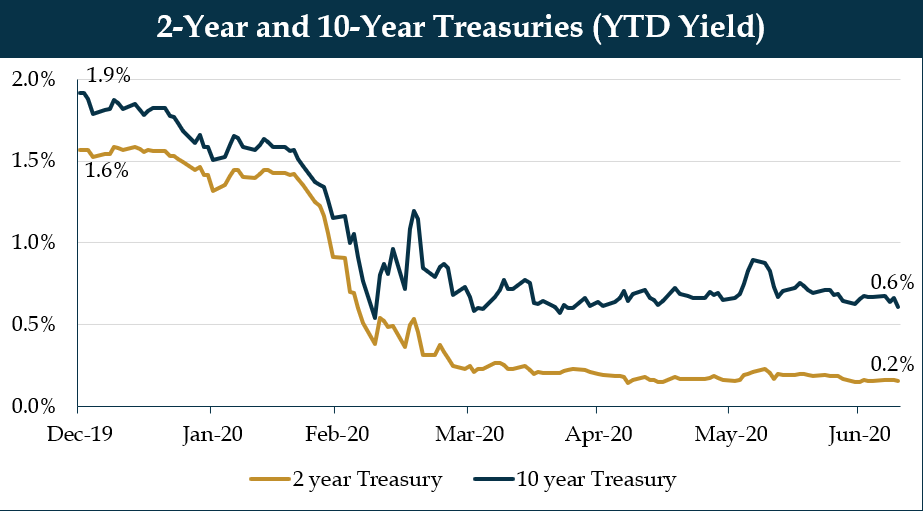
We Think the Bond Market will be a More Accurate Predictor of the Future
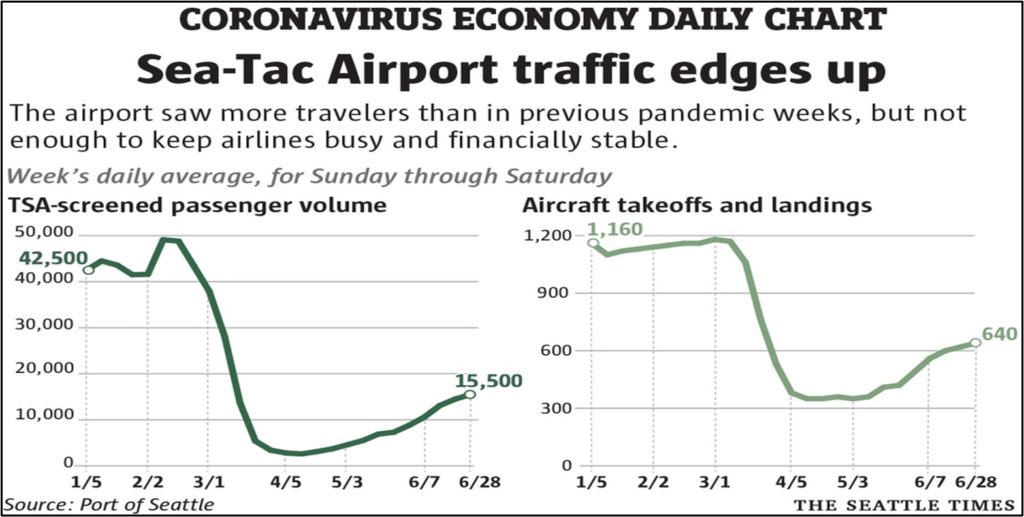
Airline passenger volume at Sea-Tac airport is running around 31-36% of normal making it nearly impossible for airline companies to turn a profit.
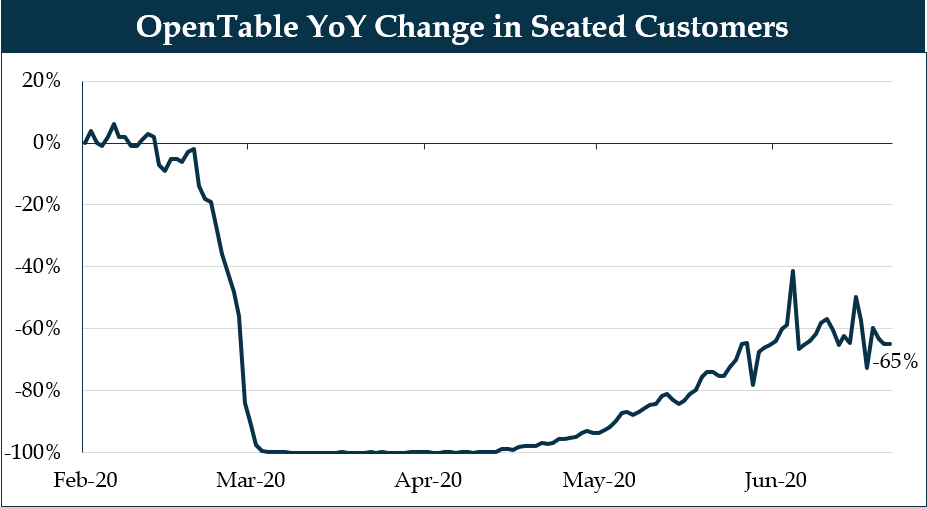
Restaurant data provided by Open Table is a great barometer of the recovery of consumer-related dining activity in real time. A burst of optimism on 6/21 has been followed by the reality that we are not done with COVID-19 yet. We don’t expect to see a sustained increase in consumer-facing business activity until we have a credible vaccine.
An Updated Education in Real Estate
According to NAREIT, here are the relative sizes of US commercial real estate markets in 2018:
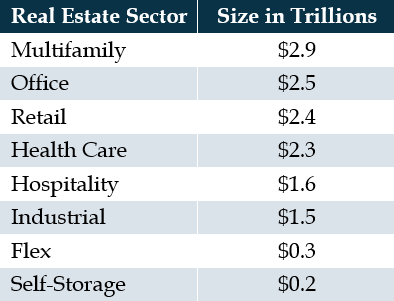
Prior to COVID-19, we would have ranked real estate categories in terms of attractiveness in the following order:
- Mobile Home Parks (included in multi-family above)
- Affordable Housing (included in multi-family above)
- Student Housing (included in multi-family above)
- Industrial
- Office
Post COVID-19, we’ve learned that Student Housing when there are no students is riskier that we thought. Office now looks wildly overbuilt as many employees prefer to work from home. Our experience at Freestone with our own employees is that most want to continue working from home. Most retail real estate was already in bad shape pre-COVID, but the pandemic accelerated the pressure on shopping centers and strip malls. We think there are going to be numerous loan defaults over the next couple of years which may create some interesting investment opportunities.
Your To-Do List
- Mortgage interest rates are near all-time lows. If you have a mortgage on your personal or vacation home, now is an excellent time to consider refinancing. We are not alone in noticing this phenomenon, however, and mortgage lenders are extremely busy with a surge in refinancing activity. This process can be cumbersome even in normal times, but the end result of reduced borrowing costs or improved cash flow could be worth it. Ask your Client Advisor for help.
- If your net worth is over $10 million and you are over 70 years of age, now is a great time to review your estate planning and consider gifting while the estate tax exemption is at an all-time high level of $11.58 million. Your Client Advisor can provide referrals to qualified estate attorneys if you are not working with one currently.
- We continue to recommend lower exposure to stocks vs. a “normal” allocation for most of our clients given many of the continued risks described above. If you feel you are overexposed to stocks, or perhaps you added some earlier in the year when markets were lower, it may be time to discuss rebalancing with your Client Advisor.
Important Disclosures: This post contains general information, opinions and market commentary and is only a summary of certain issues and events that we believe might be of interest generally. Nothing in this post is intended to provide, and you should not rely on it for, accounting, legal, tax or investment advice or recommendations. We are not making any specific recommendations regarding any security or investment or wealth management strategy, and you should not make any decisions based on the information in this post. While we believe the information in this post is reliable, we do not make any representation or warranty concerning the accuracy of any data in this post and we disclaim any liability arising out of your use of, or reliance on, such information. The information and opinions in this post are subject to change without notice, and we do not undertake responsibility to update any information herein or advise you of any change in such information in the future. This post speaks only as of the date indicated. Past performance of any investment or wealth management strategy or program is not a reliable indicator of future results. Portions of this post constitute “forward-looking statements” and are subject to a number of significant risks and uncertainties. Any such forward-looking statements should not be relied upon as predictions of future events or results.
